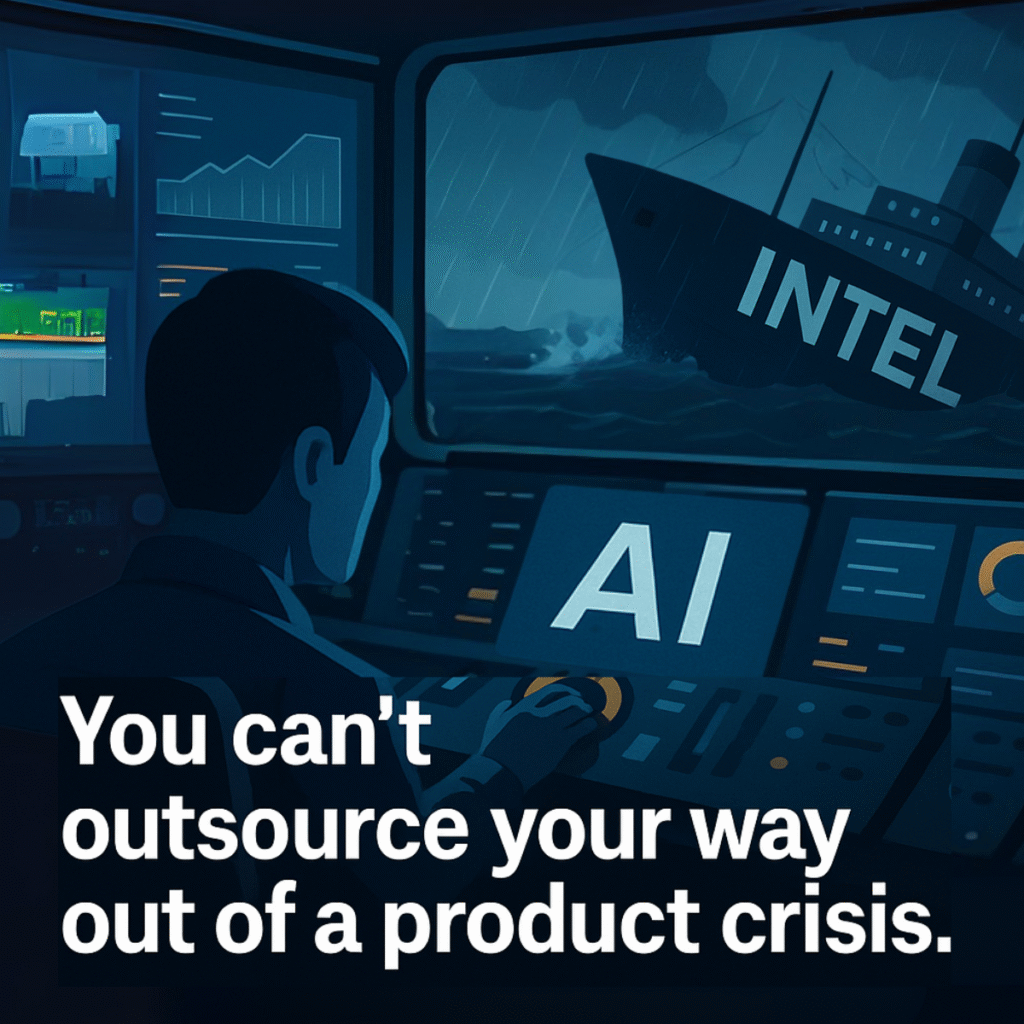Intel is making a big bet, and it’s not on chips. It’s on the power of narrative.
Last week, the semiconductor giant announced a sweeping restructuring of its marketing function, laying off an undisclosed number of employees and outsourcing much of the work to consulting firm Accenture, supported by artificial intelligence. On paper, it’s about modernisation, agility and becoming more responsive to customer needs. But the reality is more sobering and more revealing.
Intel is trying to solve a product crisis with a PR fix.
While its official line talks about transformation and better digital experiences, this is a classic cost-cutting move presented in the language of innovation. Strip away the buzzwords and you’re left with a company under pressure, shedding cost, and searching for relevance. AI provides the perfect storyline to make it sound strategic.
And Intel is unlikely to be the last.
A Familiar Script
In its memo to staff, Intel said the transition to Accenture and AI would simplify decision-making and help serve customers more effectively. The company blamed internal slowness and complexity, saying competitors were moving faster and customers expected more.
But the broader context tells a different story. Sales have fallen by over 30 percent in recent years. Intel’s position in key markets like data centres and CPUs has been eroded by rivals. The company is investing billions in chip manufacturing and desperately trying to reposition itself in the AI era.
Marketing, often viewed as overhead rather than a core function, was an obvious place to cut.
Using AI to justify the decision isn’t just convenient—it’s clever. It allows the company to reframe painful layoffs as progress. Across the industry, a similar pattern is emerging. Amazon’s Andy Jassy has said AI will reduce workforce needs. Duolingo, Klarna and Shopify have also made cuts with automation in the background.
This may be just the beginning of a wave of AI-rationalised restructures.
What Intel Gets Wrong
The problem is that marketing was never the issue. Intel’s challenge is product, not promotion.
While NVIDIA dominates the AI compute market and AMD continues to grow, Intel is playing catch-up. Major customers like Apple have moved to their own silicon. Cloud giants like Amazon and Google are designing chips in-house. Even Intel’s AI chip, Gaudi 3, has struggled to gain meaningful traction.
No amount of external agency support or algorithmic efficiency can fix a weak product roadmap.
And in outsourcing marketing, Intel is cutting away the very teams who understand the brand, the customer, and the strategic nuance of their markets. These are the people who connect dots internally—between product, sales, and customer experience. Losing them might make the business leaner. It won’t make it smarter.
A Cost-Saving Play Disguised as Strategy
There’s no question that Intel will see short-term benefits from this move. Campaigns might move faster. Costs will come down. There will be fewer internal meetings, fewer bottlenecks.
But the long-term risks are substantial. Brand consistency can suffer. Customer insight can thin out. Creativity becomes templated. And the company starts to look, sound and feel like everyone else relying on the same outsourced playbook.
In the end, the core problem remains unchanged. Intel’s relevance isn’t being questioned because its marketing was too slow. It’s being questioned because its products are no longer leading the market.
A Broader Shift is Coming
Intel is setting a precedent many others will follow. AI is quickly becoming the go-to rationale for restructuring. Companies under pressure will lean into automation narratives to justify layoffs, outsourcing, and radical changes to how they work.
It will be positioned as transformation. But in many cases, it will be damage control.
For marketers, the implications are clear. The bar for demonstrating strategic value just got higher. Delivering campaigns won’t be enough. Leaders will expect marketing to prove its role in growth, brand equity and competitive advantage. Teams that can’t show that will be vulnerable, no matter how talented they are.
AI Isn’t the Problem. Misplaced Focus Is.
AI will absolutely transform marketing. It will enhance workflows, sharpen targeting and improve decision-making. But it won’t fix a weak product, reposition a legacy business, or rebuild customer trust.
Intel’s decision might help its bottom line in the short term. But unless it pairs this restructure with real product innovation, it risks becoming a cautionary tale.
The companies that win in this market will still need great marketing. But more than anything, they’ll need a reason to matter.



